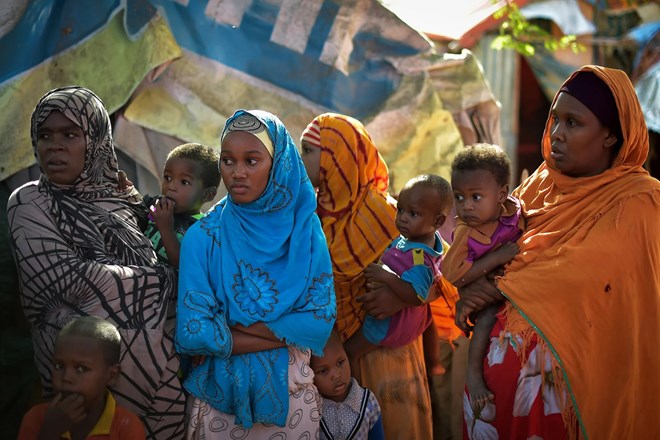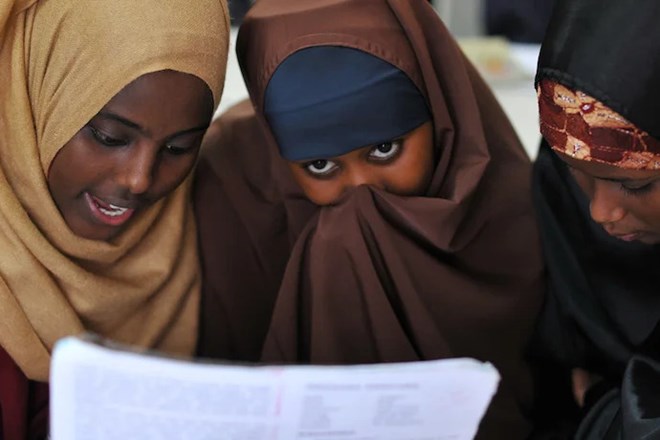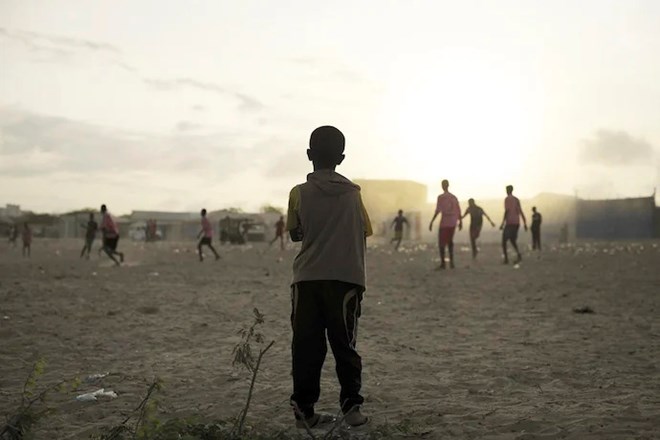
Wednesday February 28, 2024
By IBRAHIM SULTAN
The challenges facing Somalia include frail institutions, persistent violence, and belligerent factions.

A group of Somali women stand near a water point at a IDP camp in Mogadishu. (Tobin Jones)
As we traverse the third decade of the 21st century, Somalia stands at a crossroads. The path it chooses may lead to a future shaped by democracy, tolerance, and prosperity or, conversely, marred by decline, conflict, and stagnation. The pivotal factor hinges on the nation’s resolve to cultivate a democratic society with robust institutions capable of nurturing national development and making a constructive mark on the global stage.
Somalia’s disconcerting score of just 8 out of 100 in Freedom House’s 2023 Democracy Index serves as a stark indicator of the nation’s current democratic health. This alarmingly low ranking places Somalia at the nadir among its African counterparts in several critical areas, including corruption, institutional integrity, governance, and economic stability. This is juxtaposed with a reflective yearning for the bygone ‘glories of the seventies’—an era overshadowed by authoritarian regimes more focused on erecting barriers rather than empowering its people.
In the Somali context, democracy transcends a mere ideological construct or administrative mechanism. It is a concept deeply rooted in the nation’s historical tapestry, influenced by indigenous beliefs, customs, religious tenets, political dynamics, intellectual elitism, and foreign intercessions. Traditional authoritarian clan councils have historically wielded significant influence in Somali society, occasionally contributing to intertribal harmony. Nevertheless, aspirations for justice, liberty, and equality persist across generations, even as prevailing societal norms may compel individuals to resign to their plight.
Somali cultural practices can be broadly categorized into those that may conflict with democratic ideals and those that can be adapted to support them. For instance, certain customs contribute to tribal exclusion, gender bias in leadership, and the overlooking of women’s rights, all of which stand in opposition to democratic values. Conversely, the tradition of internal cooperation within clans presents an opportunity to foster a spirit of inclusivity and democratic engagement.
Somali refugees in 2011. (Udey Ismail/Flickr)
From the standpoint of religion, democracy is sometimes perceived as an alien, Western ideology, at odds with Islamic principles. Yet, historically, various Islamic societies have been pioneers in embracing notions of pluralism, peaceful coexistence, and tolerance, predating similar developments in the West.
Somalia’s struggle with democracy is deeply rooted in its complex political history. During the nascent years of independence (1960-1969), the political arena was dominated by parties often tied to tribal allegiances, manipulating the democratic system to seize control, rather than to uphold democratic ideals. This period was tarnished by electoral malpractices and tribal conflicts within state institutions, leading to a profound sense of public disenchantment.
The military takeover that ensued (1969-1991) ushered in a period of rigid authoritarian rule, cloaked in the guise of socialism. This regime stifled dissent, enforced a single-party system, pursued aggressive military policies, and eventually spiraled into chaos, marked by isolation from the international community and a catastrophic blend of civil war and famine that lasted from 1991 until 2012.
Despite strides toward stabilization and the conclusion of the transitional phase in Somalia, the vestiges of past cultural and political customs persist. The eagerness with which the end of the transitional period has been recognized by both Somali politicians and the international community belies a sense of exhaustion with the enduring adversities faced by the Somali people.
The fragility of democracy in Somalia is exacerbated by the lack of direct electoral processes, a provision outlined yet unfulfilled by the provisional constitution. Successive administrations have faltered in transitioning to a system of direct elections. Instead, political representation and ministerial appointments have been governed by the entrenched ‘4.5 formula’ derived from Somali reconciliation conferences. This framework attempts to balance power among four major tribes, with a collective half-share allocated to a conglomerate of minority clans.
While intended to ensure equitable representation, the formula has been criticized for perpetuating unfairness in a society where individuals ostensibly enjoy equality. The absence of civic oversight compounds this issue, with tribal leaders wielding the power to appoint parliamentary representatives. The result is a system ripe for manipulation, where political allegiance can be secured through patronage, allowing tribal loyalty to eclipse national interest. Such practices undermine policies critical for national security, economic development, and social welfare.
Young children playing football next to a camp for internally displaced persons in Mogadishu in 2017. (Tobin Jones)
The entrenchment of oligarchy and nepotism in government appointments, often veiled under the guise of ‘democracy,’ has led to widespread cynicism among the populace. Many perceive ‘democracy’ as mere political jargon, repurposed cyclically during the allocation of official roles. This disillusionment casts a long shadow over the nation’s prospects, engendering a bleak view of Somalia’s democratic evolution.
In Somalia, there exists a perception that an elite cohort of intellectuals and members of civil society preside over what has been termed a ‘hotel democracy,’ where discussions and decisions are confined to insular gatherings, with little outreach to or interaction with the wider populace. For these sectors to honor their historical role effectively, a reevaluation of their approach is imperative, prioritizing greater public engagement and accountability of political figures.
The political landscape in Somalia is not immune to external influences, which reverberate across the East African region. These influences emanate from a myriad of sources, including neighboring states, Western nations, and newer actors in Somali affairs such as Turkey and China, as well as the Gulf states. The nature of this external engagement is multifaceted, manifesting in political endorsements, financial assistance for administrative and military endeavors, and investments in educational, healthcare, and developmental initiatives, alongside partnerships with human rights entities, media, and civil organizations.
Arguably, the most detrimental impact on the Somali democratic process stems from selective international backing of particular politicians and factions, often resulting in biased electoral funding and advocacy for narrow, partisan objectives that diverge from the broader goal of fortifying democratic institutions. It is incumbent upon the global community to consolidate its efforts in support of a unified vision: the establishment of a resilient and democratic Somali state.
Democracy is an expansive concept with definitions that span from the foundational — a government by the people, where power is exercised through elected representatives — to the more complex nuances of liberal and social democracy, which weave in layers of rights and freedoms. At its core, it’s a structure where competitive elections underpin the people’s authority.
In considering the embodiment of democracy in Somalia, it would be a reductionist error to view it as a mirage of a European oasis, awaiting only a constitutional proclamation to realize its full spectrum. This perspective neglects the intricate layers of Somalia’s current condition and its evolutionary stages of governance. While the protracted European journey to democracy cannot be the yardstick for Somalia, certain prerequisites must be in place for democracy to take root in Somali soil — a grounding in reality is essential here.
These prerequisites bifurcate into institutional and developmental scaffolding.
Institutionally, the focus is on the bedrock of peace and the rule of law. Somalia’s position, 156th on the Institute for Economics and Peace’s 2023 list, underscores the symbiotic relationship between peace and democracy. Our premise is clear: without peace, personal safety, order, and democracy falter, returning us to an anarchical state. This aspect is twofold: Public order necessitates strategic security reforms, professionalism, and accountability, bolstered by federal and international collaboration. Community cohesion relies on fostering dialogue, enabling peaceful dispute resolution, and reinforcing the rule of law.
The rule of law is a pillar of democracy, predicated on government behavior within legal confines, limitations on executive power, and a robust legal accountability framework. Conversely, the people’s domain encompasses rights and freedoms, justice, equality, and the exertion of popular pressure.
Turning to education, a staggering number of Somali youth — nearly five million — are bereft of basic education, hindered by school scarcity, poverty, displacement, and child labor. Given education’s role in shaping worldviews, the eradication of illiteracy, promotion of life skills, and cultivation of critical, humanistic thought are paramount for an informed electorate in an emergent democracy.
Developmentally, the shadow of poverty looms large, with over half the Somali population subsisting on less than $2.06 daily, as reported by the Somali National Bureau of Statistics in 2022. Poverty, corruption, and inequality erode the democratic fabric, compelling individuals and communities towards violence and illicit means of survival. Yet, research indicates a correlation between improved living standards and democratic advancement, as evidenced in countries like Singapore, despite contrasting trends in certain petrostates.
This discourse on democracy is not merely academic; it is the linchpin of Somalia’s future, a future hinging on the interplay of peace, law, education, and economic vitality. It is a narrative of aspiration, where the ideal of democracy is not a static endpoint but a dynamic journey marked by the Somali people’s resilience and the international community’s concerted support.
Ibrahim Sultan is a progressive Somali journalist, writer, and advocate for social justice. He is the Founder of the Somali Progressive Initiative.